List of Chancellors of the Duchy of Lancaster
The Chancellor of the Duchy of Lancaster is, in modern times, a sinecure office in the government of the United Kingdom. Patrick McLoughlin is the new Chancellor Duchy under Theresa May
Chancellors of the Duchy of Lancaster, 14th century
| Name | Portrait | Entered office | Left office | |
|---|---|---|---|---|
| Henry de Haydock | 1361 | 1373 | ||
| Ralph de Ergham | 1373 | 16 April 1377 | ||
| Thomas de Thelwall | 16 April 1377 | 1378 | ||
| John De Yerborough | 1378 | 10 November 1382 | ||
| Thomas Stanley (pro tem) |
10 November 1382 | 29 November 1382 | ||
| Thomas Scarle | 29 November 1382 | October 1383 | ||
| William Okey | October 1383 | 1400 | ||
Chancellors of the Duchy of Lancaster, 15th century
- John de Wakering (1400 - 1400)
- William Burgoyne (1400 - 15 May 1404)
- Thomas Stanley (15 May 1404 - 30 March 1410)
- John Springthorpe (30 March 1410 - 4 April 1413)
- John Wodehouse (4 April 1413 - 10 June 1424)
- William Troutbecke (10 June 1424 - 16 February 1431)
- Walter Sherington (16 February 1431 - 3 July 1442)
- William Tresham (3 July 1442 - 10 June 1449)
- John Say (10 June 1449 - 10 June 1462)
- Richard Fowler (10 June 1462 - 3 November 1477)
- John Say (3 November 1477-2 April 1478)
- Thomas Thwaites (2 April 1478 - 7 July 1483)
- Thomas Metcalfe (7 July 1483 - 13 September 1486)
- Reginald Bray (13 September 1486 - 24 June 1503)
Chancellors of the Duchy of Lancaster, 16th century
- John Mordaunt (24 June 1503 - 3 October 1505)
- Richard Empson (3 October 1505 - 14 May 1509)
- Henry Marney (14 May 1509 - 14 April 1523)
- Richard Wingfield (14 April 1523 - 31 December 1525)
- Thomas More (31 December 1525 - 3 November 1529)
- William Fitzwilliam (3 November 1529 - 10 May 1533)
- Sir John Gage (10 May 1533 - 1 July 1547)
- William Paget (1549) (1 July 1547 - 7 July 1552)
- John Gates (7 July 1552 - 1553)
- Robert Rochester (1553–1557)
- Edward Waldegrave (22 June 1558 - 1559)
- Ambrose Cave (1559 - 16 May 1568)
- Ralph Sadler (16 May 1568 - 15 June 1587)
- Francis Walsingham (15 June 1587 - 1590)
- Thomas Heneage (1590 - 7 October 1595)
- Seal in commission (1595–1597)
- Robert Cecil (8 October 1597 - 1599)
- Seal in commission (1599 - 16 September 1601)
Chancellors of the Duchy of Lancaster, 17th century
| Name | Portrait | Entered office | Left office | |
|---|---|---|---|---|
| John Fortescue | 16 September 1601 | 1601 | ||
| in commission | 1601 | 1601 | ||
| John Fortescue | 1601 | 1607 | ||
| Thomas Parry | 1607 | 5 June 1616 | ||
| John Dacombe & Thomas Parry |
27 May 1615 | 5 June 1616 | ||
| John Dacombe | 5 June 1616 | 1618 | ||
| in commission | 1618 | 23 March 1618 | ||
| Humphrey May | 23 March 1618 | 16 April 1629 | ||
| Edward Barrett, 1st Lord Barrett of Newburgh | 16 April 1629 | 10 February 1644 | ||
| Francis Seymour, 1st Baron Seymour of Trowbridge | 1644 | 1645 | ||
Chancellors serving Parliament and the Commonwealth
| William Grey, 1st Baron Grey of Werke & William Lenthall (commission) |
 (Lenthall) (Lenthall) |
10 February 1644 | 1648 | |
| Gilbert Gerard | 1648 | 1 August 1649 | ||
| John Bradshaw | 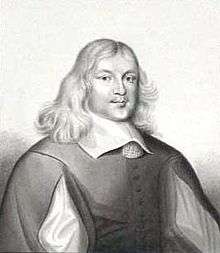 |
1 August 1649 | 1653 | |
| John Bradshaw & Thomas Fell (commissioners) |
 (Bradshaw) (Bradshaw) |
1653 | 1654 | |
| Thomas Fell | 1654 | 1658 | ||
| John Bradshaw |  |
1658 | 1659 | |
| William Lenthall |  |
1659 | 1659 | |
| Gilbert Gerard | 14 May 1659 | 9 July 1659 |
Restoration of the Monarchy
| Francis Seymour, 1st Baron Seymour of Trowbridge | 9 July 1660 | 21 July 1664 | ||
| Thomas Ingram | 21 July 1664 | 22 February 1672 | ||
| Robert Carr | 22 February 1672 | 21 November 1682 | ||
| Thomas Chicheley | 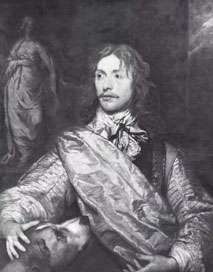 |
21 November 1682 | 1682 | |
| vacant | 1682 | 1687 | ||
| in commission | 1687 | 1687 | ||
| Robert Phelips | 1687 | 21 March 1689 | ||
| Robert Bertie, Lord Willoughby of Eresby | 21 March 1689 | 4 May 1697 | ||
| Thomas Grey, 2nd Earl of Stamford | 4 May 1697 | 12 May 1702 | ||
Chancellors of the Duchy of Lancaster, 18th century
| Name | Portrait | Tenure | Political party | |
|---|---|---|---|---|
| John Leveson-Gower (created Baron Gower, 1703) | 12 May 1702 – 10 June 1706 | Tory | ||
| James Stanley, 10th Earl of Derby |  |
10 June 1706 – 21 September 1710 | ||
| William Berkeley, 4th Baron Berkeley of Stratton | 21 September 1710 – 6 November 1714 | |||
| Heneage Finch, 1st Earl of Aylesford | 6 November 1714 – 12 March 1716 | Tory | ||
| Richard Lumley, 1st Earl of Scarbrough |  |
12 March 1716 – 19 June 1717 | ||
| Nicholas Lechmere (created Baron Lechmere, 1721) | 19 June 1717 – 17 July 1727 | |||
| John Manners, 3rd Duke of Rutland | |
17 July 1727 – 21 May 1735 | Whig | |
| George Cholmondeley, 3rd Earl of Cholmondeley | 21 May 1735 – 22 December 1742 | Whig | ||
| Richard Edgcumbe, 1st Baron Edgcumbe |  |
22 December 1742 – 25 December 1758 (died) | ||
| Thomas Hay, 9th Earl of Kinnoull | 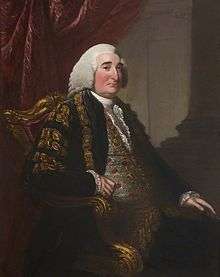 |
27 February 1759 – 13 December 1762 | Whig | |
| James Smith-Stanley, Lord Strange | |
13 December 1762 – 14 June 1771 | ||
| Thomas Villiers, 1st Earl of Clarendon | 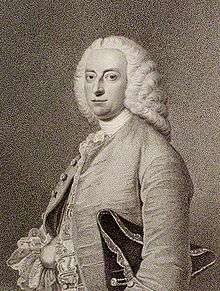 |
14 June 1771 – 17 April 1782 | Whig | |
| John Dunning, 1st Baron Ashburton | 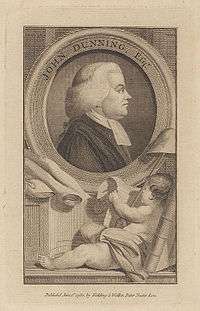 |
17 April 1782 – 29 August 1783 | Whig | |
| Edward Smith-Stanley, 12th Earl of Derby |  |
29 August – 31 December 1783 | Whig | |
| Thomas Villiers, 1st Earl of Clarendon |  |
31 December 1783 – 6 September 1786 | Whig | |
| Charles Jenkinson, 1st Baron Hawkesbury (created Earl of Liverpool, 1796) |  |
6 September 1786 – 11 November 1803 | ||
Chancellors of the Duchy of Lancaster, 19th century
| Name | Portrait | Concurrent office(s) | Tenure | Political party | Prime Minister | |||
|---|---|---|---|---|---|---|---|---|
| Thomas Pelham, 2nd Baron Pelham |  |
11 November 1803 – 6 June 1804 | Whig | Henry Addington | ||||
| Henry Phipps, 3rd Baron Mulgrave |  |
6 June 1804 – 14 January 1805 | Tory | William Pitt the Younger | ||||
| Robert Hobart, 4th Earl of Buckinghamshire |  |
14 January – 10 July 1805 | ||||||
| Dudley Ryder, 1st Earl of Harrowby |  |
Ambassador Extraordinary and Minister Plenipotentiary to Berlin, Vienna and St Petersburg (1805) | 10 July 1805 – 12 February 1806 | |||||
| Edward Smith-Stanley, 12th Earl of Derby |  |
12 February 1806 – 30 March 1807 | Whig | William Grenville (Ministry of All the Talents) | ||||
| Spencer Perceval |  |
Chancellor of the Exchequer | 30 March 1807 – 11 May 1812 | Tory | William Cavendish-Bentinck, 3rd Duke of Portland | |||
| Chancellor of the Exchequer Prime Minister Leader of the House of Commons (from October 1809) |
Himself | |||||||
| Robert Hobart, 4th Earl of Buckinghamshire |  |
President of the Board of Control | 23 May – 23 June 1812 | Robert Jenkinson, 2nd Earl of Liverpool | ||||
| Charles Bathurst | President of the Board of Control (January 1821–February 1822) | 23 June 1812 – 13 February 1823 | no party | |||||
| Nicholas Vansittart, 1st Baron Bexley | 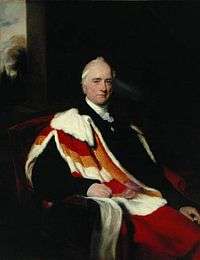 |
13 February 1823 – 26 January 1828 | Tory | |||||
| George Canning (April–August 1827) | ||||||||
| F. J. Robinson, 1st Viscount Goderich | ||||||||
| George Hamilton-Gordon, 4th Earl of Aberdeen |  |
26 January – 2 June 1828 | Arthur Wellesley, 1st Duke of Wellington | |||||
| Charles Arbuthnot | 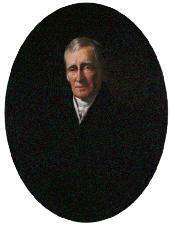 |
2 June 1828 – 25 November 1830 | ||||||
| Henry Vassall-Fox, 3rd Baron Holland | .jpg) |
25 November 1830 – 14 November 1834 | Whig | Charles Grey | ||||
| William Lamb, 2nd Viscount Melbourne | ||||||||
| vacant | 14 November – 26 December 1834 | Arthur Wellesley, 1st Duke of Wellington (Caretaker) | ||||||
| Charles Williams-Wynn | |
26 December 1834 – 8 April 1835 | Conservative | Robert Peel | ||||
| Henry Vassall-Fox, 3rd Baron Holland | .jpg) |
23 April 1835 – 31 October 1840 | Whig | William Lamb, 2nd Viscount Melbourne | ||||
| George Villiers, 4th Earl of Clarendon |  |
Lord Privy Seal | 31 October 1840 – 23 June 1841 | |||||
| Sir George Grey, Bt. |  |
23 June – 30 August 1841 | ||||||
| Lord Granville Somerset | |
3 September 1841 – 27 June 1846 | Conservative | Robert Peel | ||||
| John Campbell, 1st Baron Campbell | 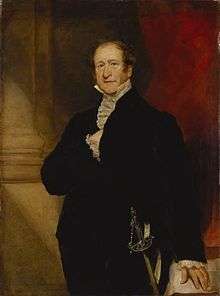 |
6 July 1846 – 6 March 1850 | Whig | John Russell | ||||
| George Howard, 7th Earl of Carlisle |  |
First Commissioner of Woods and Forests (until July 1850) | 6 March 1850 – 21 February 1852 | |||||
| Robert Christopher | 1 March – 17 December 1852 | Conservative | Edward Smith-Stanley, 14th Earl of Derby | |||||
| Edward Strutt | 3 January 1853 – 21 June 1854 | Whig / Radical | George Hamilton-Gordon, 4th Earl of Aberdeen (Coalition) | |||||
| Granville Leveson-Gower, 2nd Earl Granville |  |
21 June 1854 – 30 January 1855 | Whig | |||||
| vacant | February – March 1855 | |||||||
| Dudley Ryder, 2nd Earl of Harrowby |  |
31 March – 7 December 1855 | Henry John Temple, 3rd Viscount Palmerston | |||||
| Matthew Baines | 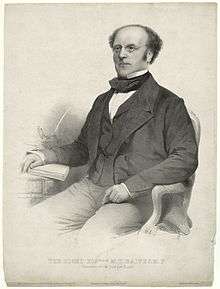 |
7 December 1855 – 21 February 1858 | Whig | |||||
| James Graham, 4th Duke of Montrose | 26 February 1858 – 11 June 1859 | Conservative | Edward Smith-Stanley, 14th Earl of Derby | |||||
| Sir George Grey, Bt. |  |
22 June 1859 – 25 July 1861 | Whig / Liberal | Henry John Temple, 3rd Viscount Palmerston | ||||
| Edward Cardwell |  |
25 July 1861 – 7 April 1864 | Liberal | |||||
| George Villiers, 4th Earl of Clarendon |  |
7 April 1864 – 3 November 1865 | Liberal | |||||
| vacant | 3 November 1865 – 26 January 1866 | John Russell | ||||||
| George Goschen | 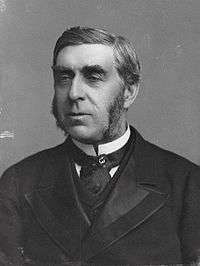 |
Vice-President of the Board of Trade (until March 1866) | 26 January – 26 June 1866 | Liberal | ||||
| William Courtenay, 11th Earl of Devon | 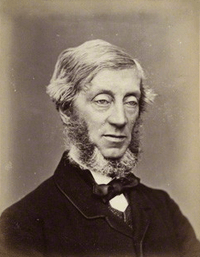 |
President of the Poor Law Board (from May 1867) | 10 July 1866 – 26 June 1867 | Conservative | Edward Smith-Stanley, 14th Earl of Derby | |||
| John Wilson-Patten |  |
26 June 1867 – 7 November 1868 | ||||||
| Chief Secretary for Ireland (from September 1868) | Benjamin Disraeli (from February 1868) | |||||||
| Thomas Taylor | |
7 November – 1 December 1868 | ||||||
| Frederick Hamilton-Temple-Blackwood, 5th Baron Dufferin and Claneboye (created Earl of Dufferin in 1871) |  |
Paymaster-General | 12 December 1868 – 9 August 1872 | Liberal | William Ewart Gladstone | |||
| Hugh Childers |  |
9 August 1872 – 30 September 1873 | ||||||
| John Bright |  |
30 September 1873 – 17 February 1874 | ||||||
| Thomas Taylor | |
2 March 1874 – 21 April 1880 | Conservative | Benjamin Disraeli (Earl of Beaconsfield from 1876) | ||||
| John Bright |  |
28 April 1880 – 25 July 1882 | Liberal | William Ewart Gladstone | ||||
| John Wodehouse, 1st Earl of Kimberley |  |
Colonial Secretary | 25 July – 28 December 1882 | |||||
| John George Dodson |  |
28 December 1882 – 29 October 1884 | ||||||
| George Trevelyan |  |
29 October 1884 – 9 June 1885 | ||||||
| Henry Chaplin |  |
24 June 1885 – 28 January 1886 | Conservative | Robert Gascoyne-Cecil, 3rd Marquess of Salisbury | ||||
| Edward Heneage | |
6 February – 16 April 1886 | Liberal | William Ewart Gladstone | ||||
| Sir Ughtred Kay-Shuttleworth, Bt. |  |
16 April – 20 July 1886 | ||||||
| Gathorne Gathorne-Hardy, 1st Viscount Cranbrook |  |
Lord President of the Council | 3 – 16 August 1886 | Conservative | Robert Gascoyne-Cecil, 3rd Marquess of Salisbury | |||
| John Manners (7th Duke of Rutland from 1888) | 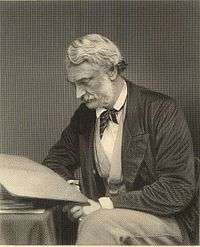 |
16 August 1886 – 11 August 1892 | ||||||
| James Bryce |  |
18 August 1892 – 28 May 1894 | Liberal | William Ewart Gladstone (until March 1894) | ||||
| Archibald Primrose, 5th Earl of Rosebery | ||||||||
| Edward Marjoribanks, 2nd Baron Tweedmouth |  |
Lord Privy Seal | 28 May 1894 – 21 June 1895 | |||||
| R. A. Cross, 1st Viscount Cross |  |
29 June – 4 July 1895 | Conservative | Robert Gascoyne-Cecil, 3rd Marquess of Salisbury | ||||
| Henry James, 1st Baron James of Hereford | 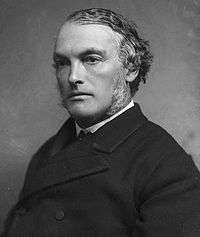 |
4 July 1895 – 8 August 1902 | Liberal Unionist | |||||
| Arthur Balfour (from 12 July 1902) | ||||||||
Chancellors of the Duchy of Lancaster, 20th century
Edwardian and wartime
| Name | Portrait | Concurrent office(s) | Tenure | Political party | Prime Minister | ||
|---|---|---|---|---|---|---|---|
| Sir William Hood Walrond, Bt. | 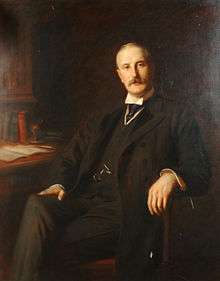 |
8 August 1902 – 4 December 1905 | Conservative | Arthur Balfour Coalition | |||
| Sir Henry Fowler |  |
10 December 1905 – 13 October 1908 | Liberal | Henry Campbell-Bannerman | |||
| H. H. Asquith | |||||||
| Edmond Fitzmaurice, 1st Baron Fitzmaurice | |
13 October 1908 – 25 June 1909 | |||||
| Herbert Samuel | 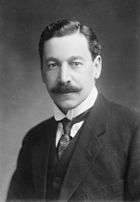 |
25 June 1909 – 14 February 1910 | |||||
| Jack Pease | 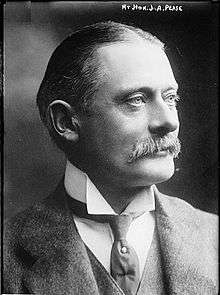 |
14 February 1910 – 23 October 1911 | |||||
| Charles Hobhouse |  |
23 October 1911 – 11 February 1914 | |||||
| Charles Masterman | 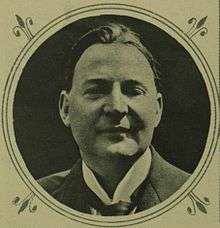 |
11 February 1914 – 3 February 1915 | |||||
| Edwin Samuel Montagu |  |
3 February – 25 May 1915 | |||||
| Winston Churchill |  |
25 May – 25 November 1915 | H. H. Asquith (War coalition) | ||||
| Herbert Samuel |  |
Postmaster-General | 25 November 1915 – 11 January 1916 | ||||
| Edwin Samuel Montagu |  |
11 January – 9 July 1916 | |||||
| Thomas McKinnon Wood |  |
Financial Secretary to the Treasury | 9 July – 10 December 1916 | ||||
| Frederick Cawley |  |
10 December 1916 – 10 February 1918 | David Lloyd George (Coalition) | ||||
| Max Aitken, 1st Baron Beaverbrook |  |
Minister of Information | 10 February – 4 November 1918 | Liberal Unionist | |||
| William Hayes Fisher, 1st Baron Downham |  |
4 November 1918 – 10 January 1919 | Conservative | ||||
| David Lindsay, 27th Earl of Crawford | |
10 January 1919 – 1 April 1921 | |||||
| William Peel, 2nd Viscount Peel |  |
Minister of Transport | 1 April 1921 – 7 April 1922 | ||||
| William Sutherland |  |
7 April – 19 October 1922 | Liberal | ||||
| James Gascoyne-Cecil, 4th Marquess of Salisbury |  |
Lord President of the Council | 24 October 1922 – 25 May 1923 | Conservative | Bonar Law | ||
| J. C. C. Davidson | 25 May 1923 – 22 January 1924 | Stanley Baldwin | |||||
| Josiah Wedgwood |  |
22 January – 3 November 1924 | Labour | Ramsay MacDonald | |||
| Robert Cecil, 1st Viscount Cecil of Chelwood |  |
10 November 1924 – 19 October 1927 | Conservative | Stanley Baldwin | |||
| Ronald McNeill, 1st Baron Cushendun | 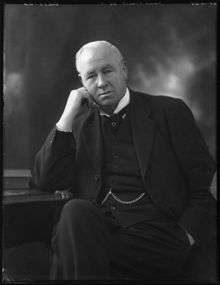 |
19 October 1927 – 4 June 1929 | |||||
| Oswald Mosley |  |
responsibility for unemployment | 7 June 1929 – 19 May 1930 | Labour | Ramsay MacDonald | ||
| Clement Attlee |  |
23 May 1930 – 13 March 1931 | |||||
| Arthur Ponsonby, 1st Baron Ponsonby of Shulbrede | 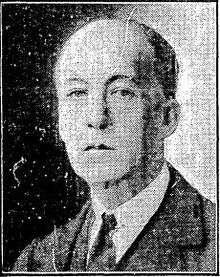 |
13 March – 24 August 1931 | |||||
| Philip Kerr, 11th Marquess of Lothian | 25 August – 10 November 1931 | Liberal | Ramsay MacDonald (1st Nat. coalition) | ||||
| J. C. C. Davidson | sometime chairman of the Indian States inquiry | 10 November 1931 – 28 May 1937 | Conservative | Ramsay MacDonald (2nd Nat. coalition) | |||
| Stanley Baldwin (3rd Nat. coalition) | |||||||
| Edward Turnour, 6th Earl Winterton | 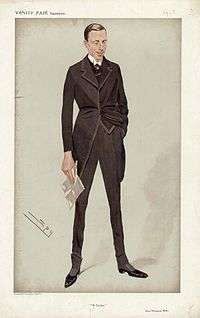 |
Air Ministry spokesperson in the Commons (March – May 1938) | 28 May 1937 – 29 January 1939 | Neville Chamberlain (4th Nat. coalition) | |||
| William Morrison |  |
29 January 1939 – 3 April 1940 | |||||
| Minister of Food (from 4 September 1939) | Neville Chamberlain (War coalition) | ||||||
| George Tryon, 1st Baron Tryon | 3 April – 14 May 1940 | ||||||
| Maurice Hankey, 1st Baron Hankey |  |
14 May 1940 – 20 July 1941 | no party | Winston Churchill (War coalition) | |||
| Duff Cooper |  |
20 July 1941 – 11 November 1943 | Conservative | ||||
| Ernest Brown | 11 November 1943 – 25 May 1945 | National Liberal | |||||
| Arthur Salter | 25 May – 26 July 1945 | Conservative | Winston Churchill (Caretaker coalition) | ||||
Post-War
| Name | Portrait | Concurrent office(s) | Tenure | Political party | Prime Minister | |||
|---|---|---|---|---|---|---|---|---|
| John Hynd | Minister for Germany and Austria | 4 August 1945 – 17 April 1947 | Labour | Clement Attlee | ||||
| Frank Pakenham, 1st Baron Pakenham |  |
deputy Foreign Secretary (responsibility for the British zone, West Germany) |
17 April 1947 – 31 May 1948 | |||||
| Hugh Dalton |  |
31 May 1948 – 28 February 1950 | ||||||
| A. V. Alexander, 1st Viscount Alexander of Hillsborough |  |
28 February 1950 – 26 October 1951 | Labour Co-operative | |||||
| Philip Cunliffe-Lister, 1st Viscount Swinton | Minister of Materials | 31 October 1951 – 24 November 1952 | Conservative | Winston Churchill | ||||
| Frederick Marquis, 1st Baron Woolton (created Viscount Woolton, 1953) |  |
Minister of Materials (1 September 1953 – August 1954) | 24 November 1952 – 20 December 1955 | |||||
| Anthony Eden | ||||||||
| George Douglas-Hamilton, 10th Earl of Selkirk | 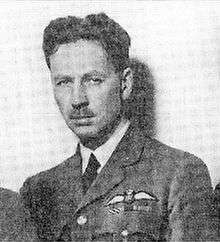 |
20 December 1955 – 13 January 1957 | ||||||
| Charles Hill | 13 January 1957 – 9 October 1961 | Harold Macmillan | ||||||
| Iain Macleod | 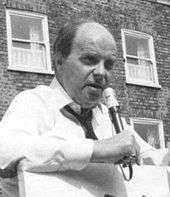 |
Leader of the House of Commons | 9 October 1961 – 20 October 1963 | |||||
| John Hare, 1st Viscount Blakenham | Deputy Leader of the House of Lords Chairman of the Conservative Party |
20 October 1963 – 16 October 1964 | Alec Douglas-Home | |||||
| Douglas Houghton | special responsibility for Social Services | 18 October 1964 – 6 April 1966 | Labour | Harold Wilson | ||||
| George Thomson | 6 April 1966 – 7 January 1967 | |||||||
| Frederick Lee | 7 January 1967 – 6 October 1969 | |||||||
| vacant or Thomson? | 6 October 1969 – 20 June 1970 | |||||||
| Anthony Barber | responsibility for UK—EEC relations (chiefly, until 1973, negotiating entry) |
20 June – 28 July 1970 | Conservative | Edward Heath | ||||
| Geoffrey Rippon | .jpg) |
28 July 1970 – 5 November 1972 | ||||||
| John Davies | 5 November 1972 – 4 March 1974 | |||||||
| Harold Lever | 5 March 1974 – 4 May 1979 | Labour | Harold Wilson | |||||
| James Callaghan | ||||||||
| Norman St John-Stevas | Leader of the House of Commons Minister for the Arts |
5 May 1979 – 5 January 1981 | Conservative | Margaret Thatcher | ||||
| Francis Pym |  |
Leader of the House of Commons Paymaster-General |
5 January – 14 September 1981 | |||||
| Janet Young, Baroness Young | Leader of the House of Lords | 14 September 1981 – 6 April 1982 | ||||||
| Cecil Parkinson | Paymaster-General | 6 April 1982 – 11 June 1983 | ||||||
| Arthur Cockfield, Baron Cockfield | 11 June 1983 – 11 September 1984 | |||||||
| Grey Ruthven, 2nd Earl of Gowrie | Minister for the Arts | 11 September 1984 – 3 September 1985 | ||||||
| Norman Tebbit | |
Chairman of the Conservative Party | 3 September 1985 – 13 June 1987 | |||||
| Ken Clarke |  |
Minister for Inner Cities (DTI) | 13 June 1987 – 25 July 1988 | |||||
| Tony Newton | Minister of State at DTI | 25 July 1988 – 24 July 1989 | ||||||
| Kenneth Baker | Chairman of the Conservative Party | 24 July 1989 – 28 November 1990 | ||||||
| Chris Patten |  |
28 November 1990 – 10 April 1992 | ||||||
| William Waldegrave |  |
responsibility for public services and science | 10 April 1992 – 20 July 1994 | John Major | ||||
| David Hunt | 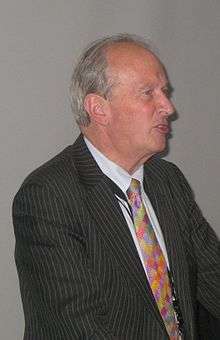 |
Minister for Public Services | 20 July 1994 – 5 July 1995 | |||||
| Roger Freeman | 5 July 1995 – 2 May 1997 | |||||||
| David Clark | 3 May 1997 – 27 July 1998 | Labour | Tony Blair | |||||
| Jack Cunningham | Cabinet Office Minister | 27 July 1998 – 11 October 1999 | ||||||
| Mo Mowlam |  |
11 October 1999 – 11 June 2001 | ||||||
Chancellors of the Duchy of Lancaster, 21st century
| Name | Portrait | Concurrent office(s) | Tenure | Political party | Prime Minister | |||
|---|---|---|---|---|---|---|---|---|
| Baron Macdonald of Tradeston | Cabinet Office Minister | 11 June 2001 – 13 June 2003 | Labour | Tony Blair | ||||
| Douglas Alexander |  |
13 June 2003 – 8 September 2004 | Labour | |||||
| Alan Milburn | |
8 September 2004 – 6 May 2005 | Labour | |||||
| John Hutton |  |
6 May 2005 – 2 November 2005 | Labour | |||||
| Vacant | 2 November 2005 – 5 May 2006 | |||||||
| Hilary Armstrong |  |
Cabinet Office Minister Minister for Social Exclusion |
5 May 2006 – 27 June 2007 | Labour | ||||
| Ed Miliband | .jpg) |
Cabinet Office Minister | 28 June 2007 – 3 October 2008 | Labour | Gordon Brown | |||
| Liam Byrne | |
3 October 2008 – 5 June 2009 | Labour | |||||
| Baroness Royall of Blaisdon | 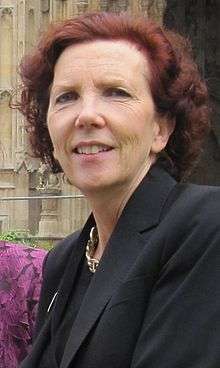 |
Leader of the House of Lords | 5 June 2009 – 11 May 2010 | Labour | ||||
| Baron Strathclyde | |
12 May 2010 – 7 January 2013 | Conservative | David Cameron (Coalition) | ||||
| Baron Hill of Oareford | |
7 January 2013 – 14 July 2014 | Conservative | |||||
| Oliver Letwin |  |
Minister of State for Government Policy | 14 July 2014 – 14 July 2016 | Conservative | ||||
| in charge of the Cabinet Office | David Cameron (II) | |||||||
| Patrick McLoughlin | 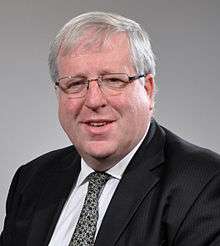 |
Chairman of the Conservative Party | 14 July 2016 – Incumbent | Conservative | Theresa May | |||
References
This article is issued from Wikipedia - version of the 11/12/2016. The text is available under the Creative Commons Attribution/Share Alike but additional terms may apply for the media files.